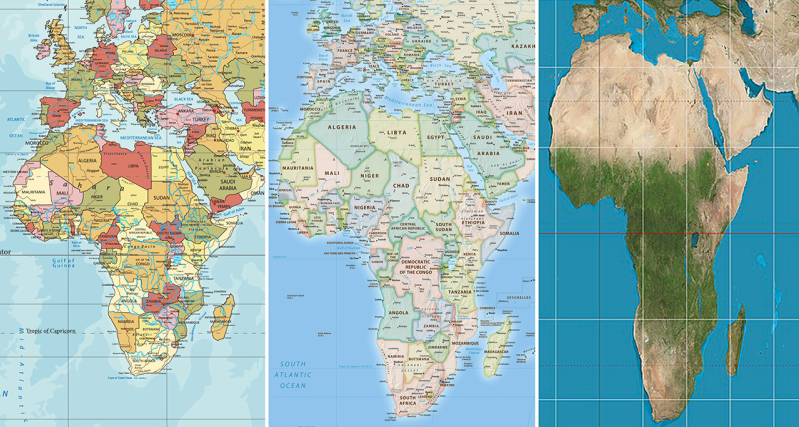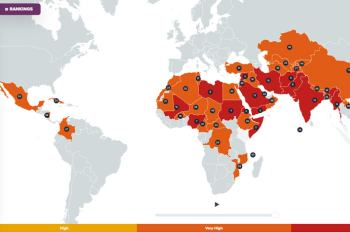
The African Union’s (AU) recent push to retire the Mercator projection in classrooms and public institutions is more than cartographic housekeeping—it is a moral claim about truth and dignity.
The Mercator map has stretched the Global North and shrunk equatorial lands.
For five centuries, the Mercator map has stretched the Global North and shrunk equatorial lands, visually minimizing Africa’s vastness. In 2025, the AU has endorsed alternatives like the Equal Earth projection, arguing that maps should reflect the world as it is, not as colonizing empires once preferred it to be.
Maps are symbols that form imaginations and imaginations shape policy. Improving the map relative to other nations, especially colonizing ones, is a matter of justice for those who have had distorted maps imposed upon them. A more equitable map will help amend prevailing narratives about the African continent and bring positive changes to Africans’ self-perception among other nations in the world.
For example, on a typical Mercator classroom map, Greenland looks comparable in size to Africa. Whereas, in reality, Africa is about 14 times larger! I am a father of three daughters and I often wonder how the prevailing Mercator projection conditions or shapes how my children view global dynamics and geopolitics.
The Mercator map’s visual lie has quietly conditioned generations.
The Mercator map’s visual lie (which enlarges Europe/North America and reduces Africa and other equatorial nations) has quietly conditioned generations to underestimate Africa’s scale and significance. Equal area projections correct this, giving all children a truer mental picture of the world they inhabit.
If they only have a Mercator projection as a reference and look at Africa among the other nations it influences their perception of Africa. Our children could become disillusioned with this historical misrepresentation on a map in their classrooms or believe that Africa’s representation on this map is an unquestionable fact.
By changing the map, we can start to positively alter the self-perception of future generations of Africans. I believe we should be rightly proud of the size and wealth of our continent and use it responsibly for the betterment of the world.
Africa has been heralded as the new center of global Christianity and is predicted to impact Christendom for the next century. With many Africans now migrating to the Global North will this growing influence for the gospel and the Kingdom of God have an impact proportionate to its true geographical size there? Only time will tell if a fresh perspective of the relative size of the African continent to the rest of the world will increase our confidence and sense of responsibility to contribute to the world and, especially, take the gospel to others.
We can be truly free, ultimately, only together.
For Christians, truth telling begins with creation’s goodness and the imago Dei. The image of God within Africa deserves to be correctly represented in all manner of ways. To misrepresent Africa is to also misrepresent our neighbors, who God has called us to love. The AU’s call to make a new map compulsory is resonant with a biblical ethic of truth and justice—of equitability. It can help Africans throughout the continent develop a sense of common unity. Once this is established we can participate better in the world. As Archbishop Desmond Tutu taught through the lens of Ubuntu: “We can be truly free, ultimately, only together. We can be human only together.”
Christians need to be reminded that Africa’s identity need not be borrowed. We have a rich Christian heritage. North Africa gave the Church Tertullian of Carthage, who helped forge the language of Latin theology; and Augustine, the Berber bishop of Hippo, whose Confessions and City of God writings still shape the global Church.
Africa is not a spiritual periphery but the very cradle and carrier of the Christian faith.
Long before modern missions, an Ethiopian treasury official encountered the gospel on the road in Gaza and carried it home. An early sign that Africa is not a spiritual periphery but the very cradle and carrier of the Christian faith.
Formally updating the map matters. Cartographic diminishment has long overlapped with extractive economics and geopolitical paternalism. Restoring Africa’s true proportions resets assumptions about partnership, voice, and value.
Yet truth in cartography must be matched by truth within the house (within the continent of Africa). The Christian vision of shalom insists that true freedom comes not only from resisting external domination but also from repentance over internal sin that manifests as greed, impunity, and the violence that emerges from these roots.
Transparency International’s latest index still places Sub-Saharan Africa at the bottom regional average (33/100), a warning that corruption weakens public trust, bleeds resources, and twists development priorities.
The economic literature is equally clear. Where governance is weak, natural wealth invites conflict and distortion. This is what theologians might call the “fallenness” of systems. The World Bank associates fragility and resource dependence to slower growth and poorer outcomes. In plain terms, institutional strength determines whether resources heal or harm. Changing the proportions of a map can only do so much. We Africans need to change the proportions of our hearts.
A truer world map and a truer public ethic belong together.
African Christian thought offers language for transformation. John Mbiti’s communal axiom, “I am because we are; and since we are, therefore I am”, captures both the theological depth of African person-hood and the civic responsibility it implies. A truer world map and a truer public ethic belong together. If we see rightly and believe rightly, and then live rightly together, we will take our place in the world rightly, to be a blessing to all nations.
Jim Olang is Head of Communications and Programs for the Associations of Evangelicals in Africa. He is a seasoned communication and development expert hailing from Kenya, holding a Bachelor of Arts (BA) in Communications (Honours) and a Masters (MA) in Theology from the Africa International University. With a wealth of experience in strategic religious engagement. He is also a key member of the Global Leadership Team of the Refugee Highway Partnership. In addition, Jim acts as the Africa Coordinator for Edifi, a Christian Podcasting Network. Drawing from a diverse background working with international organizations, Jim brings a unique blend of skills and a profound commitment to both the proclamation and demonstration of the gospel.






